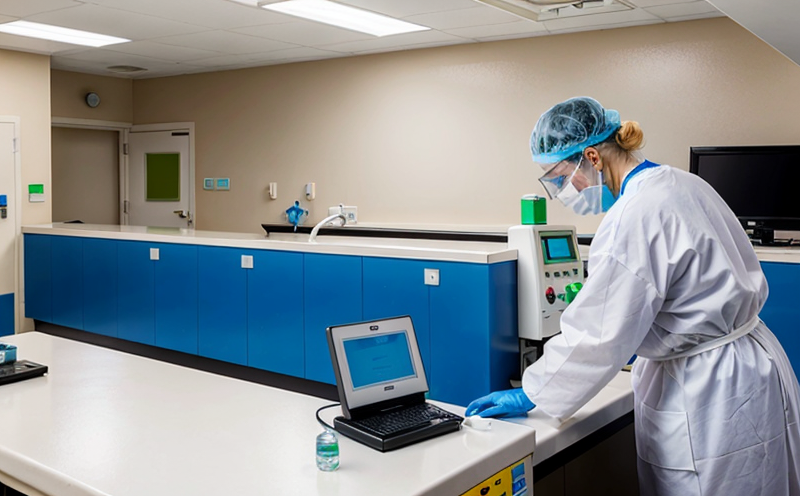Ozone Disinfection Efficacy Testing in Hospital Surfaces
As quality managers and compliance officers in healthcare settings, ensuring that hospital surfaces are free from pathogens is paramount. Ozone disinfection has gained significant traction as a non-chemical method for surface sterilization due to its efficacy against bacteria, viruses, fungi, and spores.
Ozone testing in hospitals involves evaluating the effectiveness of ozone generators used in various environments such as operating rooms, intensive care units, and patient wards. This service aims to provide robust evidence that confirms the disinfection capabilities of these devices on hospital surfaces. Our laboratory uses advanced instrumentation and follows international standards like ISO 14971:2023 and ASTM E672-21.
The testing process begins with selecting a range of common pathogens relevant to healthcare settings, including but not limited to Escherichia coli, Staphylococcus aureus, and norovirus. Specimens are inoculated onto surrogate test surfaces that mimic hospital environments, such as vinyl flooring or stainless steel. These samples are then exposed to ozone for predetermined durations under controlled conditions.
The efficacy of the disinfection is assessed by measuring residual viable counts post-exposure. This involves swabbing the treated surfaces and culturing them on appropriate media to quantify bacterial and fungal growth. For viruses, plaque assays or PCR-based methods may be employed depending on the pathogen tested.
Our facility houses state-of-the-art equipment capable of generating stable ozone concentrations at various levels, allowing us to simulate real-world conditions accurately. This includes an ozone generator with adjustable output settings and a controlled environment chamber that maintains consistent temperature and humidity throughout testing.
In addition to measuring kill rates against pathogens, we also assess the impact on surface materials and finishes. Some ozone generators produce significant amounts of reactive oxygen species which can potentially damage surfaces over time if not properly managed. Our tests ensure that this does not occur by monitoring changes in surface properties post-treatment.
- Surfaces tested include vinyl flooring, stainless steel, and ceramic tiles.
- Bacterial pathogens such as Staphylococcus aureus and Escherichia coli are frequently used for testing.
Scope and Methodology
The scope of ozone disinfection efficacy testing encompasses several key aspects crucial to the healthcare sector. We evaluate the performance of ozone generators across different environments within hospitals, focusing primarily on areas where cross-infections are most likely to occur.
Our methodology involves exposing surrogate test surfaces inoculated with selected pathogens to varying concentrations and durations of ozone. Post-treatment, samples are analyzed using methods appropriate for each type of pathogen present. This approach allows us to determine optimal operating parameters for different types of equipment used in healthcare settings.
In addition to evaluating direct antimicrobial effects, we also examine the potential secondary impacts on surface integrity and patient comfort. For instance, certain ozone generators produce significant levels of ozone gas which could pose respiratory risks if not properly managed. Our tests ensure that all devices tested comply with relevant safety regulations such as ANSI/AIA Z537.1-2016.
We employ rigorous quality control measures to maintain consistent and reliable results throughout the testing process. This includes regular calibration of our instruments, validation of test protocols against international standards, and independent verification by third-party auditors.
Eurolab Advantages
At Eurolab, we pride ourselves on offering unparalleled expertise in hospital hygiene testing. With years of experience working with leading healthcare institutions worldwide, our team brings a wealth of knowledge to each project.
We offer comprehensive support from initial consultation through final reporting, ensuring clients understand every step of the process. Our advanced facilities and cutting-edge equipment provide accurate data that can be trusted in regulatory submissions or internal decision-making processes.
Our commitment to excellence is reflected not only in our technical capabilities but also in our approachable and responsive team members who are always available to answer questions or discuss options during any stage of your project. Whether you're looking for detailed reports on specific products or broader insights into best practices, we have the resources and expertise to meet your needs.
Choosing Eurolab means choosing a partner dedicated to maintaining high standards in laboratory testing across all industries. Our clients benefit from our commitment to continuous improvement and innovation within our field.
Use Cases and Application Examples
- Ozone disinfection is used in operating rooms to sterilize surfaces before surgeries.
- In intensive care units, ozone helps maintain a sterile environment for critically ill patients.
These applications highlight the importance of accurate and reliable testing. By ensuring that ozone generators perform effectively, we contribute to maintaining safe healthcare environments.





